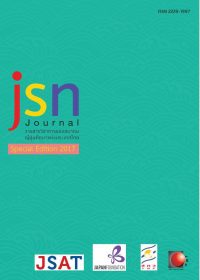Japan's Policy and the Implementation of Global human resource development: the Case of the SEND Program
Main Article Content
Abstract
The world has entered the 21st century, an era defined by information technology and global competition. The global megatrend is intensifying business competition. As trade and investment are turning to the Asia-Pacific region for new opportunities, qualified personnel with global perspectives are increasingly sought after by employers from any country. Recognizing such ongoing developments, Japan, through education reform, has placed increasing emphasis on developing quality personnel that can meet the world’s emerging challenges by internationalizing its university-level education, focusing on cooperation with leading foreign institutions—particularly those in ASEAN countries—and welcoming talented foreign students to Japan while encouraging its students to study overseas at these leading foreign institutions. This study seeks to shed light on Japan’s strategy, which builds upon its education policy, to develop leading global human resources, with the SEND Program serving as the focal case of the study. It aims to present those concerned both in Thailand and Japan with knowledge that can be applied to further formulate their respective human resource development policies. This article is structured in the following order: (a) an overall review on Japan's policy and implementation of Global human resource development, which strategically dispatches its students overseas while selectively targeting inbound foreign students; (b) performance assessment of projects initiated under such policy, with the SEND PROGRAM serving as a case study; and (c) conclusions and recommendations.
Article Details
ข้อความและข้อคิดเห็นต่างๆ ในบทความเป็นของผู้เขียนบทความนั้นๆ ไม่ใช่ความเห็นของกองบรรณาธิการหรือของวารสาร jsn Journal
References
Education in Japan. (n.d.). Internationalization. Retrieved from http://sites.miis.edu/japaned/internationalization
Global 30. (n.d.) Top 13 Universities in Japan: Offering Degree Program in English. Retrieved from http://www.uni.international.mext.go.jp/ja-JP/global30Independent Administrative Institution Japan Student Services Organization. (n.d). Result of Annual survey of International Students in Japan. Retrieved fromhttp://www.jasso.go.jp/en/about/statistics/intl_student_e/2015/index.html
Japan society for the promotion of science. (2010). Project -Establishing University Network for Internationalization. Retrieved from http://www.jsps.go.jp/j-kokusaika Japan society for the promotion of science. (n.d.). Re-Inventing Japan Project. Retrieved from http://www.jsps.go.jp/j-tenkairyoku
Japan society for the promotion of science. (n.d.). Top Global University Project. Retrieved from https://www.jsps.go.jp/j-sgu/gaiyou.html
Ministry of education culture sports science and technology. (n.d). Outline of the Student Exchange System - Study in Japan and Abroad 2010. Retrieved from http://www.mext.go.jp/component/english
Ministry of education culture sports science and technology. (n.d). Project for Promotion of Global Human Resource Development. Retrieved from http://www.mext.go.jp/en/policy/education/highered/title02
Ministry of education culture sports science and technology. (2010). The Concept of Global Human Resource Development (Focusing on the East Asian Region). Retrieved from http://www.mext.go.jp/en/policy/education/highered/title02/detail02/sdetail02/1373900.htm
Ministry of education culture sports science and technology. (n.d). The Re-Inventing Japan Project. Retrieved from http://www.mext.go.jp/en/policy/education/highered/title02/detail02/sdetail02/1373893.htm
小林明.(2011).日本人学生の海外留学阻害要因と今後の対策.独立行政法人日本学生支援機構ウィブマガジン『留学交流』
星野晶成. (2015) . 日本人大学生の東南アジア留学の現状とその特徴-JASSO統計から見えてくるもの-.独立行政法人日本学生支援機構ウィブマガジン『留学交流』
スーパーグローバル大学事業. Retrieved from http://www.jsps.go.jp/j-gjinzai/h24_kekka_saitaku.html
平成25年度産業経済研究委託事業「社会人基礎力育成の好事例の普及に関する調査」. Retrieved from http://www.meti.go.jp/policy/kisoryoku/25fy_chosa/Kiso_30sen_houkokusyo.pdf
留学生30万人計画』骨子. Retrieved from http://www.kantei.go.jp/jp/tyoukanpress/rireki/2008/07/29kossi.pdf


